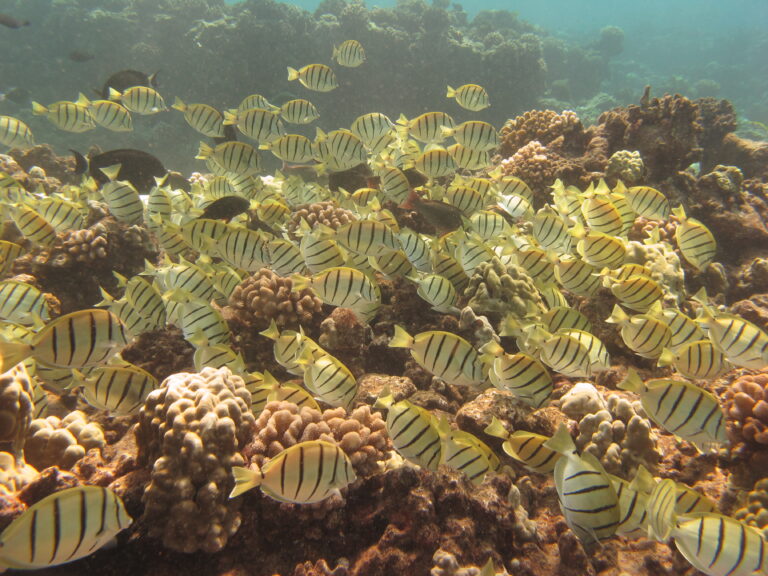Honolulu Civil Beat | July 16, 2021
By NICK GRUBE, Staff Writer
For years, the county has violated the Clean Water Act by discharging treated wastewater into the Pacific Ocean through injection wells at a Lahaina sewer plant.
WASHINGTON — A federal judge ruled Thursday that Maui County can no longer discharge treated sewage into the ocean without a permit from the U.S. Environmental Protection Agency, potentially putting an end to a decade old standoff over the reach of the Clean Water Act.
The case stems from a dispute between the county and a group of environmental nonprofits led by the Hawaii Wildlife Fund, Sierra Club of Maui and Surfrider Foundation over millions of gallons that get pumped into the ocean from a wastewater treatment plant in Lahaina.
While the treated sewage doesn’t go directly into the ocean, the county pumps it into the ground water using injection wells. The sewage then percolates through the groundwater until it reaches the ocean and suffocates the reefs, particularly around Kahekili Beach Park.
The U.S. Supreme Court ruled in April 2020 that Maui County appeared to be skirting the Clean Water Act by refusing to obtain a permit from the EPA.
The decision was a rebuke of both Maui County and the Trump administration, which had teamed up to argue that the Clean Water Act should apply to discharges that go directly into the nation’s rivers, lakes and oceans rather than pollutants that take a more circuitous route, such as through groundwater.
Many environmental groups, including Earthjustice, which represented the Maui plaintiffs, had argued that such an interpretation of the law could eviscerate the Clean Water Act and result in even more toxins entering U.S. waterways.
Some of the nation’s largest polluters, including those representing the fossil fuel industry and large scale agriculture, supported Maui County’s efforts.
After the Supreme Court sided with Earthjustice, it sent the case back to the U.S. District Court of Hawaii to determine if the treated sewage that Maui County was pumping into the groundwater was the “functional equivalent” of discharging pollutants directly into the ocean.
The county again put up a fight, arguing in court papers that the previous analyses proving that the sewage from the Lahaina wastewater treatment plant was flowing into the ocean and harming the environment were somehow flawed or inconclusive.
For example, the county’s attorneys argued that only 2% of the wastewater that flowed through two of its injection wells was actually measured for pollutants at monitoring sites along the shoreline as part of an attempt to raise questions about what happened to the remaining 98% of treated sewage.
District Court Judge Susan Oki Mollway didn’t buy it.
In a written opinion, Mollway said there was “no dispute” that 100% of the treated wastewater discharged from the Lahaina treatment plants makes its way to the ocean, which is protected by the Clean Water Act.
While some of the pollutants are diluted, she said, “a significant amount of pollutant nevertheless enters the ocean.”

She then used an analogy tied to the ongoing coronavirus pandemic to debunk the county’s 2% argument, noting that even a small fraction of millions of gallons of wastewater is still a high volume of pollution.
“This country has a population of over 300 million,” Mollway wrote. “If 2 percent of the population died from COVID-19, that would represent more than 6 million individuals. Just because 98 percent of the population survived would not mean that the federal government should leave entirely unregulated all matters relating to COVID-19.”
She noted that so far more than 600,000 people have died of COVID-19 in the U.S. alone.
Earthjustice celebrated Mollway’s decision in a press release Friday, saying that the ruling helps set the stage for future legal battles involving leaking pipelines, manure lagoons and coal ash ponds.
“Communities across this country are fighting to protect their rivers, lakes, and oceans from pollution via groundwater, from Hawai‘i to New York, and from Alabama to Montana,” Earthjustice attorney David Henkin said in a statement. “As the first court to apply the Supreme Court’s test, the Hawai‘i federal court’s ruling is a victory for clean water, for justice, and for common sense.”
Henkin, who is based in Honolulu, was the lawyer to successfully argue the case before the high court.
What comes next will be up to Maui County. According to Earthjustice, if the county does not appeal Mollway’s decision, a 2015 settlement agreement takes effect, which will require the county to spend $2.5 million on infrastructure so that it can use the treated wastewater for irrigation purposes in West Maui.
Maui County Mayor Michael Victorino declined an interview request about the ruling, and issued a statement through a spokesman.
“The County is disappointed in the District Court’s ruling but prides itself on its environmental stewardship that began decades ago when its leaders made the decision to focus on water reclamation and reuse rather than ocean outfalls,” Victorino said.
“The Lahaina facility, which was the subject of this lawsuit, treats incoming wastewater to R1 quality, the highest quality in the state. This recycled water is used for irrigation, with the excess disposed of into deep wells. A troubling aspect to this ruling is the potential impact to the County’s recycled water program.”
Victorino did not specifically address whether the county will appeal Mollway’s decision. He said the county submitted an application to the Hawaii Department of Health for a pollution discharge permit in 2012 when the lawsuit was filed.
He said the application is still pending and that the county will continue to work with state regulators.
Link to Maui Mollway Decision pdf
Civil Beat’s coverage of Maui County is supported in part by a grant from the Nuestro Futuro Foundation.
* Nick Grube is a reporter for Civil Beat. You can reach him by email at nick@civilbeat.org or follow him on Twitter at @nickgrube. You can also reach him by phone at 808-377-0246.
Original article URL:
https://www.civilbeat.org/2021/07/maui-county-loses-again-in-federal-court-over-pollution-discharges/


